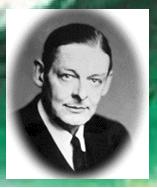 |
| T.S. ELIOT |
- Theory of Impersonality in Arts: T.S. Eliot’s theory of Impersonality of Art writers the subject of serious discussion among the writers of the modern age. In his Tradition and Individual Talent, Eliot writers, “the poet has a personality to express but a particular medium, which is only a medium and not a personality…..
- Theory of Objective co-relative: According to him, the poet should transfer his emotions to a set of objects in other words; he should objectify his emotions in a set of objects, a situation, and a chain of events. A good poet, in his view, does this.
- His view of Critic and critic: Eliot does not except any dies sanction between Creation and criticism. Therefore, he does not make any distinction between a creative artist and a critic. In his opinion, the author himself can be the best critic of his work Eliot also recommends fourth qualifications for a critic. He should be sensitive and erudite, should have a sense of his tony and facts, should possess general sing power.
- His limitations: Eliot acts as a judge yet sometimes he ceases to be impersonal while passing judgments. His critical options about Million, Shelley and Lawrence are not fully judicious, they appears to be tinged with personal biased.
- Symons, Arthur (1865-1945): He is the other poet, critic and the leading light movement. His friends included Earnest Dowson, Lioncel Johnstown and osier wiled, with whom he socialized at Rhyme club. He introduced French Symbolism to English reader in his influential study. The Symbolist Movement in Literature and also tars lasted Baudelaire’s Les Fliers Dr Mal and Zola’s L’Assommoir. His other critical studies include An Introduction To The study of Robert Browning and Studies in Elizabethan Drama etc. He particularly influenced the work of W.B. Yeats.
T.S. Eliot and Arthur Symons: Pioneers of 20th Century Literary Criticism: Key Points:
- T.S. Eliot and Arthur Symons were two of the most important literary critics of the 20th century.
- They both helped to shape the way we think about literature by introducing new ideas and methods of criticism.
- Eliot was particularly interested in the relationship between literature and society, while Symons was more interested in the psychology of the artist.
- Both Eliot and Symons were influenced by the work of the Symbolists, and they helped to introduce Symbolist ideas to the English-speaking world.
- Eliot's criticism was characterized by its use of close reading and its focus on the text itself. He was interested in the way that literary works use language to create meaning.
- Symons' criticism was more impressionistic and subjective. He was interested in the emotional response that literature evokes in the reader.
- Both Eliot and Symons were influential in the development of New Criticism, which was a major school of literary criticism in the mid-20th century.
- The work of Eliot and Symons continues to be influential in 21st century literary criticism. Their ideas have helped to shape the way we think about literature and its role in society.
The Waste Land And Other Poems By T. S. Eliot : T. S. Eliot : Free Download, Borrow, and Streaming : Internet Archive. (n.d.). Internet Archive. https://archive.org/details/lp_the-waste-land-and-other-poems-by-t-s-elio_t-s-eliot
T. S. Eliot: a collection of criticism : Wagner-Martin, Linda, comp : Free Download, Borrow, and Streaming : Internet Archive. (n.d.). Internet Archive. https://archive.org/details/tseliotcollectio0000wagn
After strange gods : a primer of modern heresy : Eliot, T. S. (Thomas Stearns), 1888-1965 : Free Download, Borrow, and Streaming : Internet Archive. (n.d.). Internet Archive. https://archive.org/details/afterstrangegods0000elio

Many,many thanks sir for discussing such topics which, I think, will be highly helpful for all sorts of examinations and CSC interview.I would like to request you to continue discussions on such topics. Sir please provide me with some interview tips for the C.S.C.if possible.arupkumarmondal1@gmail.com
ReplyDelete